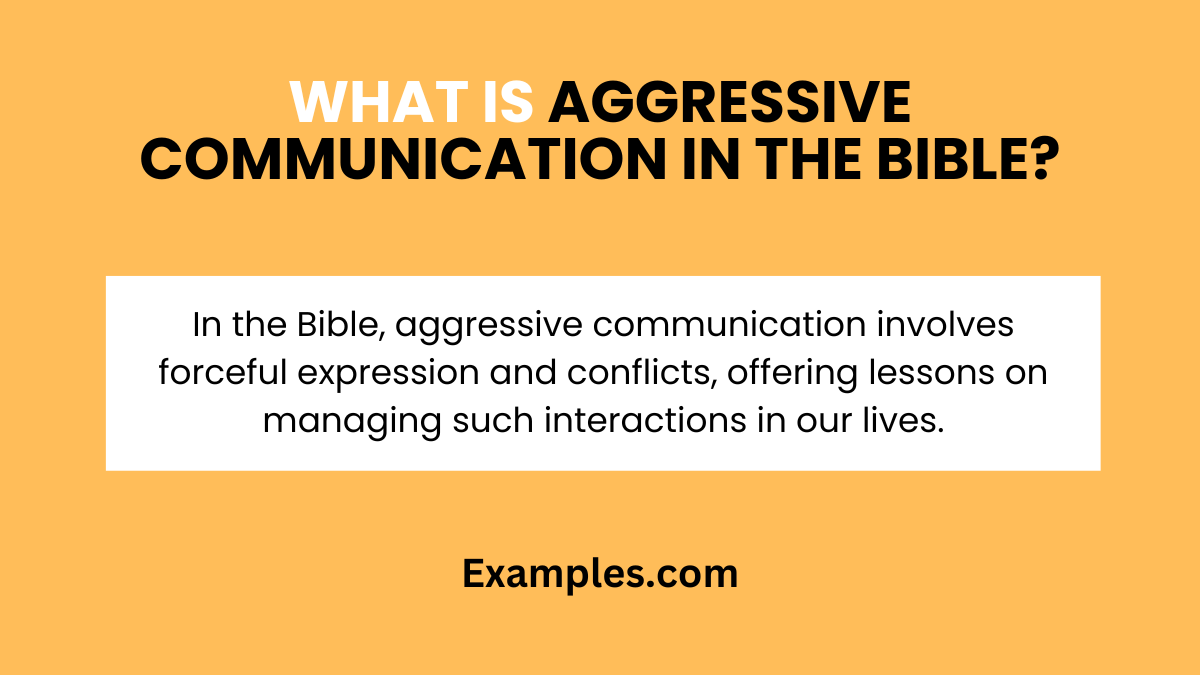14+ Aggressive Communication in the Bible Examples
In the intricate tapestry of biblical narratives, aggressive communication often surfaces, revealing profound lessons. This guide delves into various examples of such communication in the Bible, contrasting them with passive and assertive styles. It aims to provide a nuanced understanding of these interactions, highlighting their contexts and implications. By exploring these scriptural instances, we gain invaluable insights into managing and transforming our communication styles in line with biblical wisdom.
What is Aggressive Communication in the Bible?

Aggressive communication in the Bible refers to instances where figures express their thoughts or feelings forcefully, sometimes to the point of confrontation or conflict. This form of communication differs significantly from passive styles, often involving direct, powerful speech or actions. Biblical aggressive communication serves as a mirror, reflecting the human condition and offering lessons on the impact and management of such interactions in our lives.
What is the Best Example of Aggressive Communication in the Bible?

One of the most striking examples of aggressive communication in the Bible is found in the story of Jesus cleansing the temple (found in the Gospels of Matthew, Mark, Luke, and John). Here, Jesus confronts the money changers and merchants, overturning their tables and driving them out of the temple. This example stands out as it juxtaposes the usually peaceful and teaching nature of Jesus with a moment of righteous indignation, showing that even in a holy context, aggressive communication can be used to uphold justice and moral standards.
15 Aggressive Communication in the Bible Examples
- Moses Confronts Pharaoh (Exodus 5-11): Moses demands Pharaoh to let the Israelites go, speaking with divine authority.
Example: “Thus says the LORD: Let my people go.” - Jesus Cleanses the Temple (Matthew 21:12-13): Jesus forcefully expels money changers, displaying righteous anger.
Example: “My house shall be called a house of prayer, but you make it a den of robbers.” - Elijah vs. Prophets of Baal (1 Kings 18:20-40): Elijah openly challenges and mocks the prophets of Baal.
Example: “Cry aloud, for he is a god.” - Nathan Confronts David (2 Samuel 12:1-14): Nathan uses a parable to aggressively confront King David about his sin.
Example: “You are the man!” - John the Baptist’s Preaching (Matthew 3:1-12): John the Baptist speaks harshly to the Pharisees and Sadducees.
Example: “You brood of vipers! Who warned you to flee from the coming wrath?” - Paul’s Letter to the Galatians (Galatians 1:6-9): Paul expresses astonishment and reprimands the Galatians for turning to a different gospel.
Example: “If anyone is preaching to you a gospel contrary to the one you received, let him be accursed.” - Jesus Rebukes Peter (Matthew 16:23): Jesus sharply rebukes Peter for being a stumbling block.
Example: “Get behind me, Satan!” - Stephen’s Speech (Acts 7:51-53): Stephen boldly accuses the Sanhedrin of resisting the Holy Spirit.
Example: “You stiff-necked people, uncircumcised in heart and ears!” - Jesus Confronts the Pharisees (Matthew 23:1-36): Jesus denounces the Pharisees for their hypocrisy and injustice.
Example: “Woe to you, scribes and Pharisees, hypocrites!” - Samuel’s Rebuke to Saul (1 Samuel 15:10-23): Samuel confronts King Saul for his disobedience to God.
Example: “To obey is better than sacrifice.” - Paul Confronts Peter (Galatians 2:11-14): Paul opposes Peter to his face for hypocrisy regarding Gentile believers.
Example: “I opposed him to his face, because he stood condemned.” - Job’s Response to His Friends (Job 6:1-30): Job aggressively defends his innocence against his friends’ accusations.
Example: “My complaint is bitter.” - Jeremiah’s Prophecies (Jeremiah 1-52): Jeremiah often delivers God’s messages in a confrontational manner.
Example: “I am watching over my word to perform it.” - Jesus to the Rich Young Ruler (Mark 10:17-27): Jesus challenges the rich young ruler with a hard teaching.
Example: “Go, sell everything you have and give to the poor.” - Peter’s Sermon at Pentecost (Acts 2:14-40): Peter boldly accuses the crowd of crucifying Jesus.
Example: “Let all the house of Israel therefore know for certain that God has made him both Lord and Christ, this Jesus whom you crucified.”
Aggressive Communication in the Bible for Youth

In the context of youth, understanding aggressive communication in the Bible offers valuable lessons on assertiveness, respect, and moral conviction. Young individuals, often navigating the complexities of interpersonal communication, can learn how to balance assertiveness with empathy.
- Role Models: Biblical figures who displayed aggressive communication serve as role models for youth. They teach the importance of standing up for one’s beliefs, akin to assertive communication, yet caution against crossing into disrespect or harm.
- Moral Guidance: These narratives provide moral guidance, helping youth discern when aggressive communication might be necessary and justified, as opposed to passive communication that might avoid conflict but fail to address crucial issues.
- Developing Communication Skills: Engaging with these stories aids in developing robust communication skills. Youth learn to express themselves clearly and confidently, understanding the difference between being assertively passionate and aggressively domineering.
- Navigating Difficult Conversations: Biblical examples can guide youth in navigating difficult conversations. They learn to approach challenging topics with a balance of conviction and compassion, moving beyond passive-aggressive communication patterns.
- Understanding Context: It’s crucial for youth to understand the context in which aggressive communication occurs. This insight fosters a deeper understanding of effective communication and the diverse ways it can manifest.
What are the Benefits of Aggressive Communication in the Bible?
Aggressive communication in biblical contexts, when understood properly, offers several benefits:
- Asserting Truth and Justice: Many instances of aggressive communication in the Bible are centered around asserting truth and justice. This teaches the value of standing firm in one’s beliefs, a significant aspect of leadership communication.
- Clear Expression of Boundaries: Biblical figures often use aggressive communication to set clear boundaries, a necessary element in interpersonal communication. This helps in conveying limits and expectations straightforwardly.
- Demonstration of Passion and Conviction: Aggressive communication can be a demonstration of deep passion and conviction. When aligned with ethical communication, it reflects a strong commitment to one’s values and duties.
- Effective in Crisis Situations: In times of crisis, a more direct and forceful approach, as seen in various crisis communication examples in the Bible, can be crucial for immediate action and clear directives.
- Prompting Reflection and Change: Aggressive communication can be a powerful tool for prompting reflection and change, especially in situations where passive communication fails to address significant issues adequately.
How to Deal with Aggressive Communication According to the Bible?

The Bible offers wisdom on how to deal with aggressive communication effectively:
- Responding with Wisdom: In dealing with aggression, the Bible often advocates for a response that is wise and measured, emphasizing the importance of nonviolent communication.
- Seeking Understanding: Before reacting, one should seek to understand the underlying reasons behind the aggressive communication. This approach aligns with empathetic communication, fostering a deeper understanding of the situation.
- Maintaining Self-Control: The Bible advises maintaining self-control in the face of aggression, which is a crucial aspect of self-evaluation communication. It’s about responding thoughtfully rather than reacting impulsively.
- Utilizing Calm and Assertive Communication: In response to aggression, using a calm yet assertive communication style is often encouraged. This strikes a balance between passive and aggressive extremes.
- Seeking Peaceful Resolution: Finally, the Bible often guides towards seeking peaceful resolutions, highlighting the importance of conflict resolution communication. It encourages finding common ground and resolving differences amicably.
In conclusion, exploring aggressive communication in the Bible reveals a rich tapestry of lessons on assertiveness, morality, and conflict resolution. This guide offers insights and practical tips for interpreting and applying these teachings in modern contexts. Emphasizing wisdom, understanding, and balance, it encourages readers to navigate communication challenges with a blend of biblical principles and contemporary communication skills.



